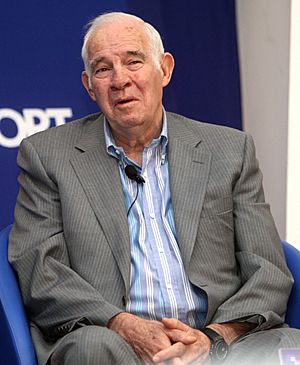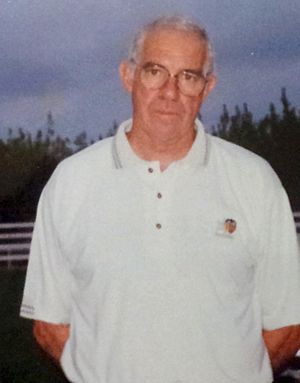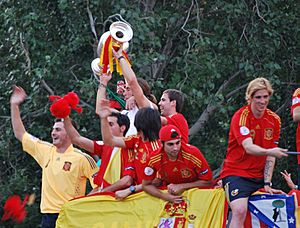Luis Aragonés facts for kids

Aragonés in 2011
|
||||||||||||||||
| Personal information | ||||||||||||||||
|---|---|---|---|---|---|---|---|---|---|---|---|---|---|---|---|---|
| Full name | José Luis Aragonés Suárez Martínez | |||||||||||||||
| Date of birth | 28 July 1938 | |||||||||||||||
| Place of birth | Hortaleza, Madrid, Spain | |||||||||||||||
| Date of death | 1 February 2014 (aged 75) | |||||||||||||||
| Place of death | Fuencarral-El Pardo, Madrid, Spain | |||||||||||||||
| Position(s) | Midfielder / Forward | |||||||||||||||
| Senior career* | ||||||||||||||||
| Years | Team | Apps | (Gls) | |||||||||||||
| 1957–1958 | Getafe Deportivo | |||||||||||||||
| 1958–1960 | Real Madrid | 0 | (0) | |||||||||||||
| 1958–1959 | → Recreativo Huelva (loan) | |||||||||||||||
| 1959–1960 | → Hércules (loan) | 24 | (17) | |||||||||||||
| 1960 | → Úbeda (loan) | |||||||||||||||
| 1960 | Plus Ultra | 8 | (11) | |||||||||||||
| 1960–1961 | Oviedo | 13 | (4) | |||||||||||||
| 1961–1964 | Betis | 82 | (33) | |||||||||||||
| 1964–1974 | Atlético Madrid | 265 | (123) | |||||||||||||
| International career | ||||||||||||||||
| 1964–1972 | Spain | 11 | (3) | |||||||||||||
| Managerial career | ||||||||||||||||
| 1974–1978 | Atlético Madrid | |||||||||||||||
| 1978 | Atlético Madrid | |||||||||||||||
| 1979-1980 | Atlético Madrid | |||||||||||||||
| 1981 | Betis | |||||||||||||||
| 1982–1986 | Atlético Madrid | |||||||||||||||
| 1987 | Atlético Madrid | |||||||||||||||
| 1987–1988 | Barcelona | |||||||||||||||
| 1990–1991 | Espanyol | |||||||||||||||
| 1991–1993 | Atlético Madrid | |||||||||||||||
| 1993–1995 | Sevilla | |||||||||||||||
| 1995–1996 | Valencia | |||||||||||||||
| 1997–1998 | Betis | |||||||||||||||
| 1999–2000 | Oviedo | |||||||||||||||
| 2000–2001 | Mallorca | |||||||||||||||
| 2001–2003 | Atlético Madrid | |||||||||||||||
| 2003–2004 | Mallorca | |||||||||||||||
| 2004–2008 | Spain | |||||||||||||||
| 2008–2009 | Fenerbahçe | |||||||||||||||
|
Medal record
|
||||||||||||||||
| *Club domestic league appearances and goals | ||||||||||||||||
Luis Aragonés Suárez (born July 28, 1938 – died February 1, 2014) was a famous Spanish football player and manager. He was known for his long career, especially with the club Atlético Madrid.
Aragonés spent most of his time playing and coaching at Atlético Madrid. He was a key player and later a successful coach for the team in the late 1960s and early 1970s. During this time, Atlético won the Spanish league title four times. They also reached the final of the European Cup in 1974.
From 1964 to 1974, he played 265 Primera Liga games for Atlético. He scored 123 goals, making him the club's all-time top goalscorer. He also played for other clubs, including Real Madrid. Luis Aragonés played 11 times for the Spanish national team, scoring three goals.
After his playing career, he coached seven other La Liga clubs. He also managed the Spanish national team. He led Spain to win their second European Championship title in 2008. After this, he coached the Turkish club Fenerbahçe. This was the only time he coached outside of Spain.
Contents
Playing Career
Early Days as a Player
Luis Aragonés started his football journey with Getafe Deportivo in 1957. In 1958, he joined Real Madrid. However, he never played for their main team. Instead, he was often loaned to other clubs like Recreativo de Huelva and Hércules. He also played for Real Madrid's reserve team, AD Plus Ultra.
In 1960, he moved to Real Oviedo. There, he made his first appearance in Spain's top league, the Primera División. From 1961 to 1964, he played for Real Betis. He played 86 league games and scored 33 goals for them.
Time at Atlético Madrid
In 1964, Aragonés joined Atlético Madrid. Here, he earned the nickname "Zapatones", which means "big boots". This was because he was very good at taking free kicks. In his first season, he helped Atlético win the Copa del Rey (a Spanish cup).
He then helped Atlético win the La Liga title in 1965–66 and again in 1969–70. In 1970, he shared the Pichichi trophy. This award is for the highest scorer in the league. He won it with his teammate José Eulogio Gárate and Amancio from Real Madrid.
Atlético won another Copa del Rey in 1973. They also won a third league title in 1973–74. The next year, Atlético reached the final of the European Cup. They played against German champions Bayern Munich. Aragonés scored a goal late in extra time, giving Atlético a 1–0 lead. However, Bayern scored an equalizer very late in the game. This led to a replay match, which Bayern won 4–0.
Aragonés retired soon after this match. He was then appointed as Atlético's coach in the same year. He is still Atlético's all-time top goalscorer. He is also ninth on the list of players with the most appearances for the club.
Playing for Spain
Luis Aragonés played his first international game for Spain on May 8, 1965. It was a friendly match against Scotland that ended in a 0–0 draw. He scored his first goal for Spain in a friendly against France in 1968. Spain won that game 3–1.
He was captain of the Spanish team once. This was in a 3–0 win over Northern Ireland in 1970. This game was part of the qualification for UEFA Euro 1972. He also scored a goal in that match.
Managerial Career
Coaching Spanish Clubs

In his first season as coach at Atlético Madrid, Aragonés led the team to win the 1974 Intercontinental Cup. They beat Independiente of Argentina 2–1 over two games. Atlético then won the Copa del Generalísimo in 1976 and the La Liga title in 1977.
After six years at Atlético, Aragonés became coach of Real Betis in 1981. He quickly returned to Atlético Madrid in 1982. In his second time coaching Atlético, his team almost won a historic double in the 1984–85 season. They won the Copa del Rey and finished second in La Liga. The next season, the team reached the final of the European Cup Winners' Cup. However, they lost 3–0 to Dynamo Kyiv.
Aragonés' success led him to become manager of Barcelona in 1987. He stayed there for one season and won the Copa del Rey. He then coached Espanyol before returning to Atlético for a third time. There, he won his sixth Copa del Rey in 1992.
After leaving Atlético for the third time in 1993, he coached several other clubs. These included Sevilla, Valencia, Real Betis, Real Oviedo, and Mallorca. His biggest achievement during this period was in the 1995-96 season. He came very close to winning the La Liga title with Valencia, finishing just four points behind the winner.
In 2001, Atlético was in the second division. Aragonés took over for a fourth time and led the team to promotion back to the top division. They won the Segunda División title in the 2001–02 season. He left the club for the last time in 2003. He is still their most successful manager, having won eight trophies.
Aragonés returned to Mallorca in October 2003. He helped the club improve its position in the league. On July 1, 2004, he became the coach of the Spanish national team.
Leading the Spanish National Team

After Spain's disappointing performance at UEFA Euro 2004, Aragonés made big changes to the national team. He brought in new, younger players and focused on a new style of play. This style, called tiki-taka, involved short, quick passes. It later became very famous with the Barcelona club team. This change was a huge step for Spanish football.
Spain did not lose any games during the qualification for the 2006 FIFA World Cup. They finished second in their group and had to play a play-off match. Spain won the play-off against Slovakia 6–2 over two games. In the World Cup finals, Spain won all their group games. However, they lost 3–1 to France in the next round.
Aragonés continued as manager for the European Championship qualifiers. Spain had a tough start but recovered well. They finished as group winners, qualifying for the tournament.
Aragonés then led Spain to victory at Euro 2008. They beat Germany 1–0 in the final, with a goal from Fernando Torres. This was Spain's first major international trophy since 1964. Aragonés was known for being superstitious. He even called Spain's yellow semi-final kit "mustard" because he disliked the color yellow!
His tiki-taka playing style was continued by the next manager, Vicente del Bosque. This style helped Spain win even more major tournaments later on.
Coaching in Turkey
After Euro 2008, Aragonés became the manager of the Turkish club Fenerbahçe on July 5, 2008. He signed a two-year contract and hoped to win the league title in his first season. However, the club finished in fourth place. He was dismissed on June 2, 2009, after the season ended.
Achievements and Awards
Player
Atlético Madrid
- La Liga: 1965–66, 1969–70, 1972–73
- Copa del Rey: 1964–65, 1971–72
- European Cup runner-up: 1974
Individual Player Awards
- Pichichi Trophy: 1969–70 (for being the top scorer)
- Atlético Madrid's all-time leading top scorer: 172 goals
Manager
Atlético Madrid
- La Liga: 1976–77
- Copa del Rey: 1975–76, 1984–85, 1991–92
- Supercopa de España: 1985
- Segunda División (Second Division): 2001–02
- Intercontinental Cup: 1974
Barcelona
- Copa del Rey: 1987–88
Spain National Team
Individual Manager Awards
- Don Balón Award (Best Coach): 1976–77
- Marca Leyenda: 2008
- IFFHS World's Best National Coach: 2008
- Gold Medal of the Community of Madrid: 2014
His Legacy
Luis Aragonés passed away on February 1, 2014, in Madrid. He died from leukemia.
The Royal Spanish Football Federation shared their sadness at his death. They said he was the coach who started Spain's most successful period in football. Diego Simeone, the current manager of Atlético Madrid, said that everyone at Atlético was sad to lose such an important part of the club. Vicente del Bosque, who took over from Aragonés as Spain's coach, said, "Luis has been the father of the successes for the National Team."
His funeral was held on February 2 in Madrid. Many famous Spanish players attended, including Carles Puyol, Cesc Fàbregas, Andrés Iniesta, and Xavi. He was buried in the cemetery of La Paz.
At the 2014 UEFA Champions League Final, Atlético Madrid players wore shirts with Aragonés' name inside the collar. This was a special tribute to him. Atlético Madrid also honored Aragonés on their club membership cards for the 2019–20 season.
See also
 In Spanish: Luis Aragonés para niños
In Spanish: Luis Aragonés para niños
 | Laphonza Butler |
 | Daisy Bates |
 | Elizabeth Piper Ensley |

